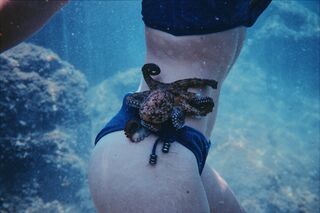Cognition
Improving Invertebrate Welfare
Which animals are conscious and how can we improve their lives?
Posted July 7, 2020

In a recent article, published in Animal Sentience (the flagship journal for animal consciousness) by Heather Browning and myself*, we argue that recent research on animal consciousness and welfare can help us to improve the lives of invertebrates (animals without spines such as octopuses), that have so far not been considered in animal welfare regulations. The article is titled 'Improving invertebrate welfare,' (hence the title of this post), and attempts to combine insights from animal welfare science and animal consciousness:
Once we have established that there is sufficient evidence for sentience in a species (or, as suggested by Birch 2017, an order), there is then the further question of what to do about it. There is both a moral and a practical question. The moral question is about what sort of moral status we should accord to a species, given that it is sentient: what role should its members play in our moral deliberations? (Browning & Veit 2020, p. 1)
This is the question usually asked by philosophers. Which moral status should we give animals once we recognize that they have consciousness, that they can feel, that they have emotions. This is not the question we are interested in—rather, we aim to answer the question of what to do once we include non-human animals within our moral communities. The answer here lies in science rather than philosophy.
Animal welfare scientists have spent the last decades on research targetted on improving the lives of the animals around us. It would be a mistake not to draw on this knowledge.
One worry about admitting concern for invertebrate welfare is that it may turn out to be too demanding. There are so many invertebrates, used in so many ways, that it might require radical changes in the political and public sphere to protect them. (Browning & Veit 2020, p. 2)
Some philosophers have called this the demandingness-objection. But this is the wrong approach—we think that we should first get clear on which animals can experience suffering and how we can improve their lives—before simply dismissing their welfare because it could be too demanding. In the following, we illustrate why this reasoning is flawed.
We would add that moral consideration of invertebrates does not have to be as demanding as might be expected. We should not presume that according moral status to invertebrates places duties on us that we don’t even apply to nonhuman vertebrates. The existence of trade-offs between human and non-human interests has long been recognized: the fact that something may be harmful does not necessarily entail that it is impermissible. (Browning & Veit 2020, p. 2)
Philosophers have suggested that it would be absurd to implement the religious practice of the Jain who constantly sweep the floor in front of them to ensure we never step on an insect (also invertebrates). But as we point out:
This does not necessarily follow from moral recognition. We could recognize sentience in insects without also assuming that they have the awareness and higher-order cognition of persisting through time that creates future-regarding preferences. This would reduce the harm caused by premature death as well as our duty to avoid doing so (Browning and Veit 2020). - [the reference here is to a different paper of ours where we discuss whether animal slaughter can ever be humane. (Browning & Veit 2020, p. 2)]
But what if insects have future-regarding preferences. What if we are concerned with welfare-losses regarding the future? Do we have to radically change all of our behavior? While this seems intuitive it may not be necessary:
Even if we were to take premature death as a more significant harm, it would not necessarily follow that we must take substantial actions to prevent it. For example, the fact that driving causes many deaths to mammalian species (Coffin 2007) including humans, is not taken to be sufficient reason to cease driving. Yet we are certain that mammals are sentient and have welfare we otherwise wish to protect. The request to stop driving would be too demanding and thus not morally required. We could similarly acknowledge that while it is harmful to insects to be stepped on, it is too demanding to take measures to ensure that this is completely prevented. So although we should not step on insects deliberately when we can avoid doing so, we are not required to sweep our paths as Jains do. From granting invertebrates moral status, it does not follow that we must make large sacrifices on their behalf. It is clearly an open question as to how demanding certain actions or sacrifices will be, and where the threshold of “too demanding” should be set (particularly in more challenging cases of complex interactions between human activities and animal harms such as in agriculture and habitat incursion), issues that are too complex to untangle here. We simply wish to point out that acknowledgement of moral status does not have to entail huge or difficult sacrifices. (Browning & Veit 2020, p. 2)
But how can we improve the lives of invertebrates? Well, there are actually many possibilities, none of which require any drastic sacrifices:
There are many small, feasible ways we can take invertebrate welfare into consideration. The science of invertebrate welfare can be intimately connected with the science of invertebrate sentience. The types of sentient experience of which invertebrates are capable will determine the range of possible benefits and harms. Consider the controversy over whether some insects can feel pain (Klein and Barron 2016; Adamo 2016; Sneddon et al. 2014; Eisemann et al. 1984). If it were to turn out that they cannot, then perhaps we do not need to be concerned about causing them tissue damage; but if they do experience other aversive mental states, such as hunger and thirst (in a qualitative and not merely cognitive sense), we should be concerned about providing adequate food and water. What is important is determining the interests the animals in question possess: what makes their lives go better or worse. (Browning & Veit 2020, p. 2)
Here, the science of animal consciousness and animal welfare science need to closely interact. Both study two different aspects of the same phenomena and could thus benefit from a much closer engagement with each other. What should we do to vermin such as cockroaches that have infested our houses? Do we have to 'live with them'? Few people actually argue for this:
The fact that cockroaches are capable of suffering does not mean it should be forbidden to kill them to prevent proliferation in homes or food storage areas. However, we may want to minimize or forbid the use of neurotoxins that cause a prolonged death and instead investigate quicker and more humane methods of killing. This has been the focus of recent work by the Wild Animal Initiative (Howe 2019). Similar work is being done on the humane control of rodents, who are known to be sentient and capable of suffering (Littin et al. 2014). This does not exclude pest control entirely, but it should constrain and guide how it is carried out. (Browning & Veit 2020, p. 3)
There are better and worse ways of treating other animals—just like there are better and worse ways of treating other humans - without the requirement to become a moral saint and give all of ones belongings to charity. Invertebrates are typically recommended to be used in research, even recommended, on ground of animal ethics guidelines. But this assumes that invertebrates cannot suffer or do so in a much-diminished way compared to vertebrates such as mammals and birds:
As typically required for vertebrate species, there could also be the need to seek appropriate methods of analgesia for use in painful experiments in invertebrates (Cooper 2011; National Research Council 2011). There may also need to be a revision of the call for “replacement” under the 3Rs (Russell and Burch 1959). Currently this calls for replacing vertebrates with invertebrates, yet they too may be harmed in research. There might also need to be improved housing conditions for captive invertebrates, whether in research, agriculture or zoos, providing appropriate shelter areas, diet and enrichment, depending on their specific needs and desires (Crook 2013; Horvath et al. 2013). (Browning & Veit 2020, p. 3)
Much of this research is tentative—but it is important! The mere fact that we presently lack evidence and knowledge should not prevent us from putting resources into both science and better policies in order to protect our fellow creatures. The growing concern for animal welfare among the public will hopefully help us to achieve these goals:
More specific examples and suggestions will come from research into the capacities and requirements of different species of invertebrates (e.g., Carere and Mather 2019). Species-specific proposals have already been made for octopuses as a result of growing knowledge (Browning 2019). Cognitive bias tests developed in mammals (Mendl et al. 2009, 2010) can, in many cases, be applied straightforwardly to invertebrates to improve their welfare. This has already been done in bees (Bateson et al. 2011). It is clearly possible to take action to improve the lives of sentient invertebrates. We should not let the “demandingness” objection prevent progress. (Browning & Veit 2020, p. 3)
What is needed, is a shift towards the animals' point of view—by drawing on the best available science. As Heather Browning argued in a previous publication: "The mind of an octopus may be highly different from our own, but it is only by trying to see the world from their point of view that we will be able to find out what is good for them and hence ensure their welfare."
*Both of the authors are scientists/philosophers.
If you are interested in animal welfare more generally, you might be interested in checking out Heather Browning's work on animal consciousness more generally.
References




